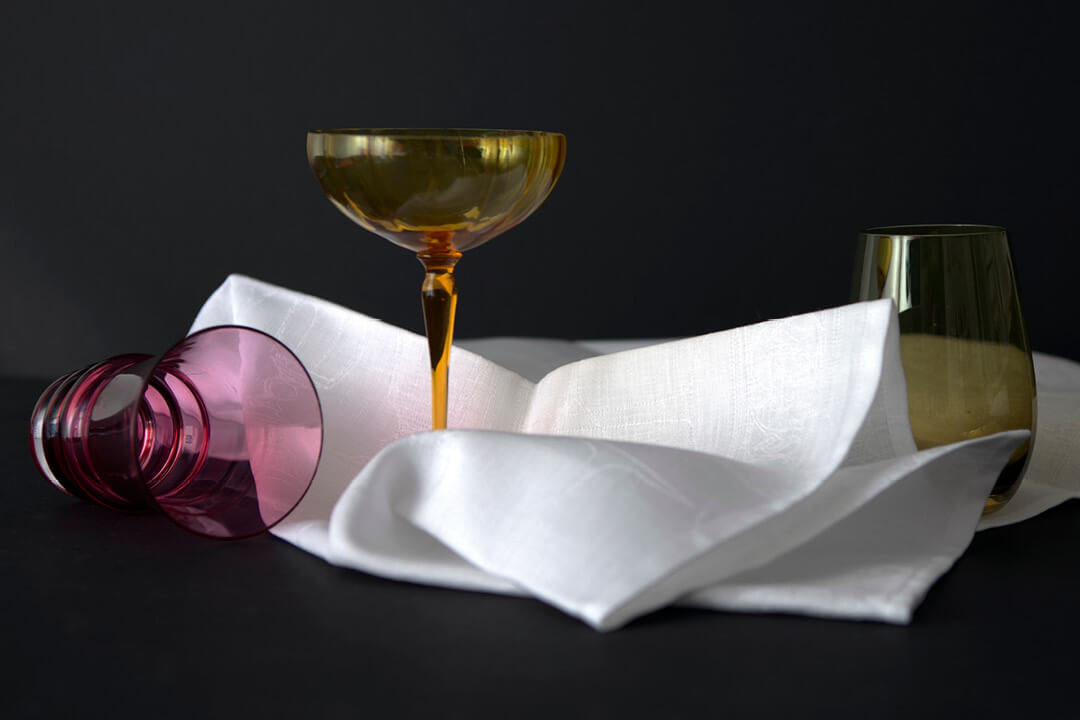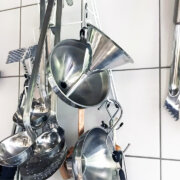FINE GLASSES LIKE LINEN
Precious glasses are usually washed by hand. A kitchen towel made of pure linen is recommended for drying.
If only, then already
Fine glasses make drinking pleasure perfect. There is no drink that does not benefit from a perfect glass: A glass in which the aromas of champagne, white wine, red wine or whisky can unfold perfectly.
The sight of a perfectly designed glass is a pleasure in itself. Every time we visit Vienna, we are almost magically drawn to the Lobmeyr store, where you can study and purchase outstanding glass designs.
Many fine glasses are very delicate, which is what makes them so attractive and enjoyable. In private households they are best rinsed by hand.
Subsequent drying is best done with a clean linen cloth.
Linen dries nobly
Cloths made of pure linen have the great advantage that, unlike cotton cloths, they leave no lint behind. At the same time, they are highly absorbent. Both are important to ensure that the glasses look perfect after drying.
As it is easy to dry with linen cloths, the odd glass stays intact for longer, which has a positive effect on credit card bills.
Invest in some beautiful linen tea towels for your glasses. We recommend white linen, which can be washed at high temperatures and will look good for years to come.
 Le Jacquard Français © GloriousMe
Le Jacquard Français © GloriousMe
But it doesn’t have to be unadorned. We use the white linen cloths from Le Jacquard Français, which are woven with a beautiful pattern. These elegant tea towels should be ironed (left) so that the person who washes the glasses the next day after a nice evening in good company can really enjoy them.
In ironed format, the kitchen towel glides through the glasses even more elegantly and efficiently and the elegant patterns of the cloths are shown to their best advantage.
Flax likes it maritime
Flax is one of the oldest cultivated plants in Europe. While the fibers are used for the production of textiles, the oil can be used as a raw material for an interesting material that has unfortunately almost been forgotten: linoleum.
Linoleum used to be a popular floor covering, and today some high-class boarding schools use linoleum as a surface for their students’ desks.
Linen cloths were the only alternative before cotton was used as a basic material for textiles. Ecologically, the old flax cultivation from which linen is obtained is ahead of the rest. It requires fewer pesticides, almost all parts of the plant can be used and flax production requires far less water than cotton.
Some time ago, we reported on how difficult it is, even for experts, to be sure that the cotton being processed was actually grown and harvested in an environmentally friendly way and without forced labor.
As flax can be grown in Europe, there is no need for costly transportation if linen production takes place in Europe. Flax likes the maritime climate with its continuous alternation of sun and rain best. For this reason, significant flax cultivation can be found in northern France, Belgium, the Netherlands and the Baltic countries.
 Flax Blooming © Alliance S. Randé, Alliance for European Flax-Linen & Hemp
Flax Blooming © Alliance S. Randé, Alliance for European Flax-Linen & Hemp
In Germany, the cultivation of flax is a niche area of agriculture. The same is true in Switzerland, where a sympathetic initiative has been working for several years to bring flax cultivation back to the forefront and ensure that all wrestling pants can soon be woven from local linen again.
If you are interested in flax and its properties from a materials research perspective, this video from the European Confederation of Flax and Hemp will give you some interesting facts.
 Flax Linen Spinning © Alliance S. Randé, Alliance for European Flax-Linen & Hemp
Flax Linen Spinning © Alliance S. Randé, Alliance for European Flax-Linen & Hemp
Useful and beautiful
From France, the land of good food and table culture, comes our elegant kitchen utensil made of white woven linen from Le Jacquard Français, which you can buy here at Manufactum.
The Leitner linen weaving mill was founded in the Austrian Mühlviertel in 1853 and is now run by the sixth generation of the Leitner family, Jakob Leitner. There, in the triangle between Bavaria, Bohemia and Austria, the company attaches great importance to the combination of ecology and elegance and offers a wide range of linen textiles, including beautiful linen napkins and bed linen. When it comes to glass polishing cloths, the white linen cloth Fresko has captured our hearts.

The Leitners’ huge looms and 25 seamstresses only process the best, long-stalked quality of flax. The shorter stalks go to China and come back as fast fashion.
Long-time GloriousMe readers know our fascination with good bread. The linen factory in Steinhude, now in its 9th generation, produces a very beautiful bread bag made of pure linen, a lovely gift idea for anyone who wants to give bread and salt as a gift for moving into a new home and wants to do without gift wrapping made of foil.
The circular economy is an important topic. From fine glasses, good bread and wine to drying the glasses with fine linen, we are part of it.
Cover picture: © GloriousMe 2024
#Advertising #ProductPlacement #IndependentRecommendation #BecauseWeLoveIt




